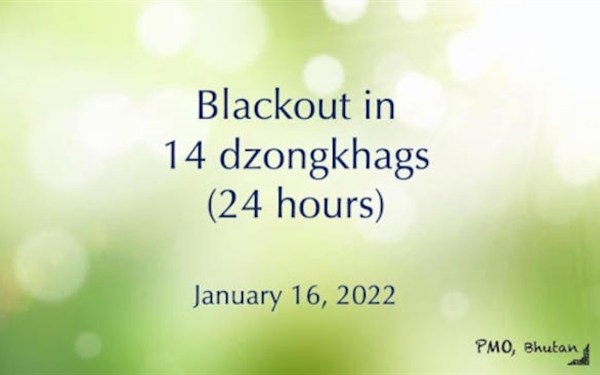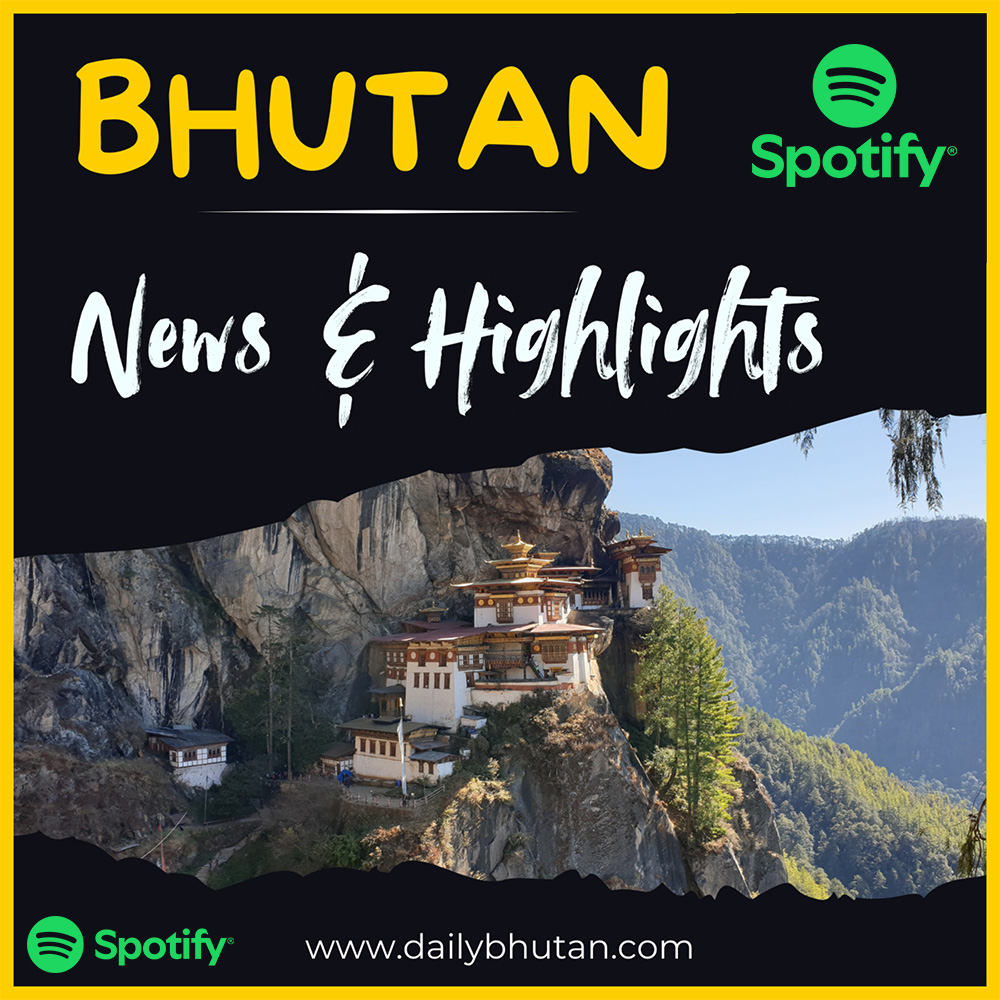Bhutan undergo blackout period to curb COVID-19 transmission
Bhutan went into a “24 hours blackout” in 14 Dzongkhags with the detection of a positive community case on 15th January 2022. 141 new cases were detected in 24 hours as of 17th January taking the country’s total active COVID cases to 412. Except for the Wangdue Phodrang Dzongkhag, the rest 13 opened to zoning system on 17th January.

In the wee hours of Sunday, 15th January 2022, the Prime Minister’s Office announced a “24 hours blackout” in 14 Dzongkhags (districts) [Thimphu, Wangduephodrang, Punakha, Paro, Gasa, Haa, Chukha, Trongsa, Bumthang, Dagana, Sarpang, Tsirang, Samtse and Zhemgang]. The blackout came after a suspected COVID-19 positive individual at Punatsangchhu project (PHPA) in Wangdue Phodrang had possibly interacted, work-related, with residents beyond.
Following the enforcement of the “blackout” period after the detection of the community case, no movement of people and vehicles were allowed except for essential purposes and emergency health-related travels towards hospitals and health facilities. In gewogs in the above-specified Dzongkhags, individuals were allowed to step out to attend to the important chores within the premises.
Collection and analysis of the samples continued into the following day, with over 13,000 individuals having moved out of Wangdue Phodrang since January 10th. They were to come forward for testing. Helpdesk 1010 and other telephone numbers for counselling services were activated for people’s enquiries and mental wellbeing respectively.
Samples collection and testing
As of 17th January morning, more than 7,800 samples were collected from the 14 districts that underwent the “blackout” period. Aside from the two from the Punatsangchhu colony, all the samples tested negative for COVID-19.
Thus, except for the specific areas in Wangduephodrang, all the 14 dzongkhags under the blackout period were opened into the zoning system for 72 hours as a cautious reopening, while being mindful of the incubation probabilities of the virus. The PHPA colonies were cordoned off and movements were allowed only within the colony.
With all 224 samples in Gelephu testing negative and 486 community samples in Phuentsholing also testing negative, the two Dzongkhags were to be placed under zoning system as the other districts for the next 72 hours. However, for Phuentsholing, it was later reverted as 7 new positive community cases were detected.
With the zoning system in place:
1. Individuals were allowed to come out using the zone card distributed earlier. Those who misplaced the zone cards or moved to a new location could call 1010 to obtain new ones.
2. Similarly, individuals can move within the gewogs. However, no inter-zones or inter-gewogs movements are allowed.
3. All offices, institutions and schools were to remain closed during the period. However, the management must activate “work from home” protocol.
4. Identified shops within the zones catering to essentials like grocery and pharmaceutical could open. The identified shopkeepers were to go for testing before opening the shops.
5. The stranded individuals with private cars were facilitated after the antigen tests at the nearest flu clinic. Please call 1010 for the movement pass.
The Prime Minister of Bhutan Addresses the Nation on BBS
The Prime Minister of Bhutan addressed the nation after the 8PM news on the national TV channel, BBS. The Prime Minister gave a status of the cases and said that of the 110 who tested positive in PHPHA, only 6 were Bhutanese and the rest were expatriate workers working in containment mode. He said that of the 7000 samples tested, only 141 tested positive.
Though there was no positive case in the capital city, Thimphu, the lockdown would be continued for 2 more days given that the virus could take time to incubate.
The Prime Minister shared his grievance that despite repeated requests to avoid gatherings, this lockdown showed that a lot of people took part in gatherings and travelled and were now requesting to travel back home. The Bhutanese positive case from Wangdue PHPA who went to Gedu had also gone to Thimphu to meet relatives and also had rimdro gatherings (religious ritual) at Gedu. All contacts were tested and so far they were all negative, the Prime Minister shared.
The Prime Minister conveyed to the citizens that His Majesty had commanded that we must continue the policy of not having any COVID cases at all. By the 19th January, another 7,000 people would be tested and if there were not many cases then the unlocking would start.
The Prime Minister further requested people to follow COVID protocols and also to use the web service links to apply for movement pass and zone cards since helpdesk 1010 couldn’t handle such huge call traffic.
Evolving situation
As of 18th January, except for areas such as Bjimithangka, Kamichhu, Taksha, Basochhu, Waglaytar and seven gewogs of Daga, Athang, Gasetsho Wom, Gasetsho Gom, Nahi, Rubesa and Thedtsho, all 14 Dzongkhags were opened to zoning system with an addendum notice.
However, a 38-year-old man tested positive at Gyalpozhing, Mongar on 17th January and a 24-hour blackout had been announced in Sengor, Lingmithang, Gyalpozhing and Mongar town for case investigation. One RBP personnel of the BCP (ICP) Samdrupjongkhar main gate tested positive on RTPCR. There are 40 primary contacts and 16 (indirect contacts. All the personnel on duty at BCP are in containment mode. The BCP main gate closed for the next 24 hours as per health advice. This shall change the country's active case numbers.
With the recent surge in positive cases since the first detection of the Omicron variant in the country on 6th January in Phuentsholing, it’s pretty much apparent that the latest COVID situation has spread its wave in the small Himalayan country. However, with 90% of its population fully vaccinated and the exemplary leadership shown by the government guided by His Majesty the King during the last few years in fighting the pandemic, the people have nothing but hope and strength to express that this phase shall pass too.




